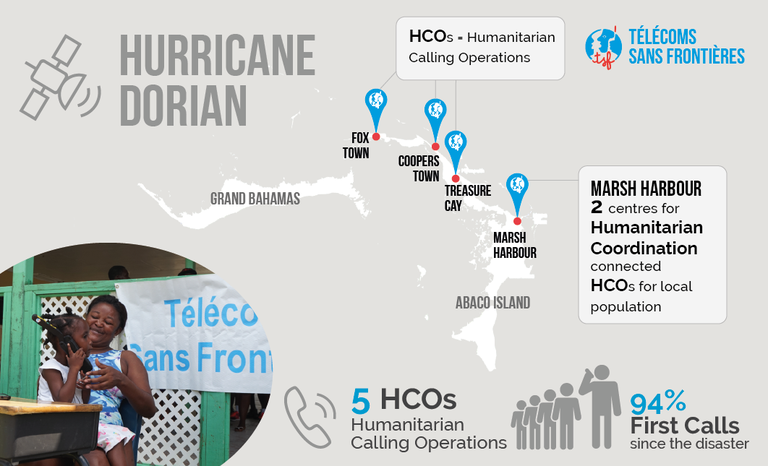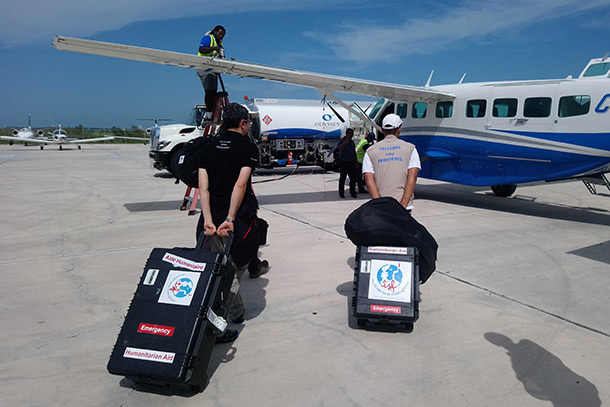Hurricane Dorian
Context : Hurricane
Start date : 03/09/2019
End date : 24/09/2019
Areas of intervention :
- Abaco
Activities :
- Support to Humanitarian Coordination
- Humanitarian Calling Operations
2 Coordination Centres
25+ humanitarian organisations supported
1000+ devices connected and 340+ GB exchanged for the humanitarian coordination
5 Humanitarian Calling Operations
94% first calls since the disaster
Context
Between Sunday 1st and Monday 2nd September, Hurricane Dorian, category 5 with winds of up to 296 km/h and a 7 m storm surge made landfall on the Abaco Islands, in The Bahamas. Dorian is not only the strongest hurricane ever hitting the country, but it has also been second strongest in the whole Atlantic since 1950. After ravaging the Abaco Island, Dorian moved west and caused severe damages to the Great Bahama Island.
The testimonials depict a disastrous situation: badly damaged roofing, power lines cut off and roads impassable. The news regarding the communications status reports that on the Abaco Island, which seems to be most affected, GSM and Landlines are completely down.
Deployment
In view of the situation, two teams have been deployed. One from our Regional Office in Mexico and a second one from our International Headquarters in France.
As soon as they arrived to Nassau on 4th September, they tried to reach Abaco Island, the most affected one. In collaboration with the National Emergency Management Agency (NEMA) and Pacific Disaster Centre (PDC), they reached the affected areas the following day to support the coordination and to meet the needs of the affected population. TSF has been one of the first international organisations to reach Abaco Island and to be operational.
Once in Nassau, the capital, they tried to reach the affected areas as soon as possible to help coordinate and respond to the needs of the affected populations.

Support to Humanitarian Coordination
As soon as TSF teams arrived on Abaco Island, they installed a broadband emergency satellite connection at NEMA’s Coordination Centre, managed by the Royal Bahamas Defence Force, isolated from the capital since the beginning of the emergency. The quickness of the installation of this first connection has been crucial, making possible the coordination of the emergency response to the affected populations.
As of September 10th, UNOCHA established a Humanitarian Hub to coordinate the activities of humanitarian actors in Abaco. From its settlement, TSF provided satellite connectivity to support the actions of the different organisations.
Both connections have supported the coordination of 25 organisations.
Humanitarian Calling Operations
In the aftermath of Hurricane Dorian, a lot of inhabitants decided to flee Abaco Island. The telecommunication networks was off for several days. Without network and electricity, the population that did not evacuated the island had no possibility to contact their families or loved ones to tell them they were safe.
After performing telecommunications assessments, our teams conducted Humanitarian Calling Operations (HCO), from September 7th, to the benefit of displaced people in the city of Marsh Harbour and surrounding affected areas. They soon expanded their operations to the north of the towns of Treasure Cay, Coopers Town and Little Abaco.
In each location, TSF provided 5-minute free calls for the victims. The majority of the calls were made to other islands of the Bahamas, to Haiti and the USA. 94% of the calls were the first contact people had with their loved ones since the disaster. Hence, the beneficiaries were able to know the situation of their relatives in other affected areas, to arrange next steps in the recovery phase, to provide information on their situation or simply to regain hope.






















